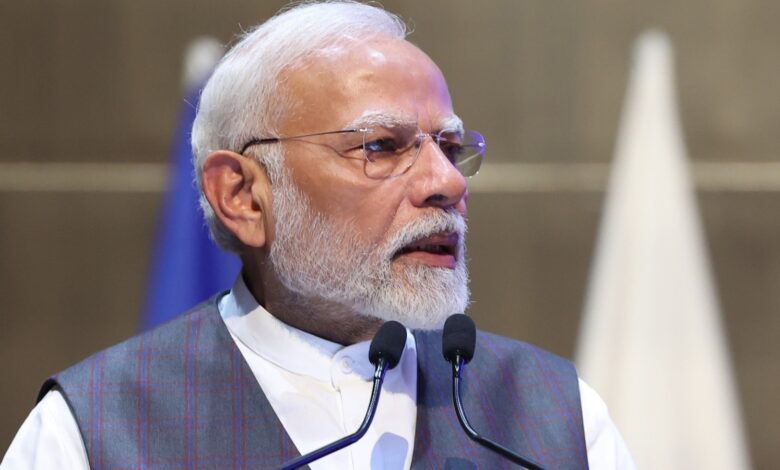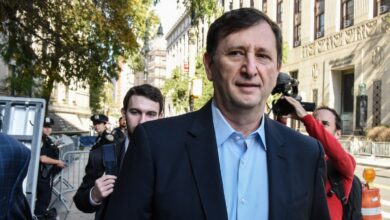Prime Minister Modi expressed concern about threats stemming from digital fraud, cybercrime, and AI technology

Prime Minister Narendra Modi on Sunday expressed concern over potential threats posed by digital fraud, cybercrime and AI technology, especially the potential for deepfake to disrupt social and family relationships .
Speaking at the concluding session of the 59th All India Director General/Inspector General of Police Conference, the Prime Minister also called for the use of technology to reduce police workload and suggested transforming police stations become a source of resources. allocation.
According to an official statement, discussions were held on emerging security concerns along the borders with Bangladesh and Myanmar, trends in urban policy and strategies to counter malicious narratives.
In-depth discussions were held on current and emerging challenges to national security, including counterterrorism, left-wing extremism, cybercrime, economic security, immigration , coastal security and drug trafficking.
The statement said Modi noted that wide-ranging discussions were held on security challenges at the national and international levels and expressed satisfaction over the counter strategies adopted. presented in the conference.
To deal with the potential threats posed by digital fraud, cybercrime and AI technology, the Prime Minister has called on police leaders to turn challenges into opportunities by harnessing the dual power of AI of India is artificial intelligence and aspirational India.
Appreciating the steps taken in urban control, Mr. Modi suggested that each initiative should be collated and implemented completely in 100 cities.
He expanded on the SMART policing mantra and called on police to be strategic, meticulous, adaptable, trustworthy and transparent.
The SMART policy idea was introduced by the prime minister at a 2014 conference in Guwahati.
It envisages systemic changes to make the Indian police stern and responsive, modern and mobile, alert and responsible, trustworthy and responsive, tech-savvy and trained (SMART).
Furthermore, an assessment of the implementation of newly enacted major criminal laws, initiatives and best practices in policing as well as the security situation in the surrounding area was carried out.
Discussing the success of hackathons in solving some key issues, the Prime Minister suggested considering organizing a hackathon for the national police.
He also emphasized the need to expand the focus on port security and prepare future action plans for this purpose.
Recalling Sardar Vallabhbhai Patel’s contribution to the Union Home Ministry, Modi called upon the entire security establishment – from the ministry to the police station level – to pay homage on his 150th birth anniversary next year by resolving to set and achieve targets in any aspect that can improve the image, professionalism and competence of the police.
He called on the police to modernize and realign itself according to the vision of Viksit Bharat.
Modi also provided insight and laid out a roadmap for the future.
Around 250 officers of the rank of director general and inspector general of police attended the three-day conference in person while over 750 others participated online. Union Home Minister Amit Shah and National Security Advisor Ajit Doval, among others, attended the meeting.
Since 2014, the Prime Minister has paid great attention to this conference. Free themed breakfast, lunch, and dinner discussions are held at the conference.
This provides an opportunity for senior police officers to share their views and suggestions on important policy and internal security issues affecting the country with the prime minister.
Until 2013, the annual meeting was held in New Delhi. In 2014, after the Modi government came to power, the government decided to organize the event organized by the Ministry of Home Affairs and the Intelligence Bureau outside the capital.
Accordingly, the conference was held in Guwahati in 2014; Dhordo, Rann of Kutch, 2015; National Police Academy, Hyderabad, 2016; BSF Academy, Tekanpur, 2017; Kevadiya in 2018; IISER, Pune, 2019; Lucknow Police Headquarters in 2021; National Agricultural Sciences Complex, Pusa, Delhi, in 2023 and Jaipur in January 2024.
Continuing this tradition, this conference was held in Bhubaneswar.
The number of business sessions and topics also increased, focusing on improving policing to serve the people.
Before 2014, discussions mainly focused on national security. Since 2014, the conferences have focused on core national security and policing issues, including crime prevention and detection, community policing, law and order, and improving police image, among other issues.
Earlier, the conference was Delhi-centric with officials coming together only for meetings. Residency at the same facility for two to three days has helped build a high spirit of solidarity among officers of all cadres and organizations since 2014, officials said.
Direct interaction between police chiefs and heads of government has led to a convergence of views on key challenges and the emergence of actionable recommendations.
Over the past few years, the topics have been selected after detailed discussions with the highest levels of the police service.
Once selected, a number of interactive presentations will be held before the police superintendent’s committees to encourage participation and incorporate ideas from the field and from young officers than.
As a result, all current presentations are broad in scope, in-depth and carry a series of compelling, actionable recommendations, officials said.
Since 2015, a detailed follow-up of the recommendations of previous conferences has become the norm and was the subject of the first business session attended by the prime minister and the interior minister.
The recommendations are monitored by the conference secretariat, headed by the Intelligence Bureau, with the help of nodal officers in the states.
Officials added that decisions taken in the past several conferences have brought about significant policy changes, leading to improved policing, including setting higher standards for effective policing in rural and urban areas as well as improving modern policing methods based on smart parameters.




